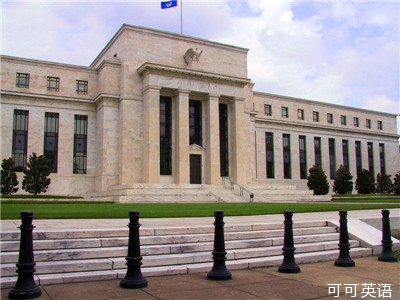
It is a hard slog running a major European investment bank these days. New rules from the U.S. Federal Reserve won't help much. But they could have been a lot worse.
如今,經(jīng)營(yíng)一家歐洲大型投資銀行可是件苦差事。美國(guó)聯(lián)邦儲(chǔ)備委員會(huì)(Federal Reserve, 簡(jiǎn)稱:美聯(lián)儲(chǔ))剛剛頒布的新規(guī)沒有帶來多大幫助,但是它們已經(jīng)比外界之前的預(yù)期寬松得多。
The Fed is trying to increase its oversight of large foreign banks including Deutsche Bank and Barclays so that their U.S. units don't fall short on capital or liquidity. That means, for example, that foreign banks with large U.S. operations will have to hold qualifying equity equivalent to 3% of their assets.
美聯(lián)儲(chǔ)力圖對(duì)包括德意志銀行(Deutsche Bank)和巴克萊(Barclays)在內(nèi)的大型海外銀行加強(qiáng)監(jiān)管,以保證它們的美國(guó)分行不會(huì)出現(xiàn)資本或者流動(dòng)性不足的狀況。比方說,新規(guī)要求在美國(guó)業(yè)務(wù)規(guī)模龐大的外資銀行必須達(dá)到3%的最低杠桿率要求。
On the face of it, banks that have run capital-light models could have to raise new funds. But they will have until 2018 to meet the rules, rather than until mid-2015 as previously feared. Banks could make up capital shortfalls by accumulating retained earnings or shrinking their balance sheets steadily.
從表面上看,以“輕資本”模式運(yùn)營(yíng)的銀行可能需要籌措新資金。但它們只要在2018年前達(dá)到要求即可,而不是之前擔(dān)心的2015年年中。充足的時(shí)間使銀行可以通過積累留存收益或逐步縮小資產(chǎn)負(fù)債表的方式來填補(bǔ)資本缺口。
Other potential headaches look manageable. One worry was that the Fed might force foreign banks to rely more on funding themselves within the U.S., rather than relying on cheap loans from their parents. But the final rules suggest such parent-to-subsidiary funding won't be penalized, according to analysts at J.P. Morgan.
其他一些可能令外資銀行頭疼的問題似乎也很好解決。市場(chǎng)曾經(jīng)擔(dān)心美聯(lián)儲(chǔ)會(huì)強(qiáng)迫外資銀行更多地通過美國(guó)境內(nèi)渠道進(jìn)行融資,而不是依靠從母公司獲得低息貸款。但摩根大通(J.P. Morgan)的分析師說,最終版本的規(guī)定暗示,母公司向子公司提供融資的這類行為不會(huì)受到懲罰。
Sure, foreign banks will have to set up local holding companies with their own risk committees and a chief risk officer. Another bureaucratic issue, yes. But a game-changing imposition, no.
當(dāng)然,外資銀行在美國(guó)當(dāng)?shù)爻闪⒌目毓晒颈仨氂凶约旱娘L(fēng)險(xiǎn)管理委員會(huì)和首席風(fēng)險(xiǎn)長(zhǎng)。這又是官僚化的做法沒錯(cuò),但卻不是什么過分的要求。
Still, all this may prove only temporary relief. U.S. banks have in general made more progress in repairing their balance sheets and adjusting their business models than their European peers. Banks such as Deutsche and Barclays are still in the middle of substantial deleveraging programs, while weighing which business lines they can and can't afford to be in.
不過,外資銀行或許只能暫時(shí)松一口氣。總體而言,美國(guó)的銀行在修復(fù)資產(chǎn)負(fù)債表、調(diào)整業(yè)務(wù)模式方面的進(jìn)步要比歐洲銀行大。德意志銀行、巴克萊等歐洲銀行仍處于大規(guī)模去杠桿化的進(jìn)程之中,正在權(quán)衡哪些業(yè)務(wù)有能力參與,哪些必須舍棄。
That is having an impact. Both Barclays and Deutsche lost market share in the all-important fixed income, currencies and commodities business last year. Rivals J.P. Morgan, Goldman Sachs and Citigroup all gained, based on data from brokerage Jefferies.
這就帶來了一個(gè)問題。從券商杰富瑞(Jefferies)提供的數(shù)據(jù)來看,在重要的固定收益、外匯和大宗商品業(yè)務(wù)領(lǐng)域,巴克萊和德意志銀行去年的市場(chǎng)份額流失,其競(jìng)爭(zhēng)對(duì)手摩根大通、高盛(Goldman Sachs)和花旗(Citigroup)的市場(chǎng)份額均有所增長(zhǎng)。
And while the Fed's rules may not be as problematic as feared, they still add to growing worries about the Balkanization of global banking. Already, European politicians have objected to the Fed imposing tougher rules on European banks than U.S. banks face in Europe. That raises the prospect of regulatory tit for tat.
雖然美聯(lián)儲(chǔ)頒布的新規(guī)可能不像外界之前擔(dān)心的那樣嚴(yán)苛,但它依然加劇了人們對(duì)銀行業(yè)分化的擔(dān)憂。關(guān)于美聯(lián)儲(chǔ)對(duì)歐洲銀行提出的監(jiān)管要求嚴(yán)于歐洲對(duì)美資銀行提出的監(jiān)管要求這一點(diǎn),歐洲政客已經(jīng)頗有微詞。這也增加了兩地監(jiān)管部門將來針鋒相對(duì)的可能性。
Six years on from the global financial crisis, the banking world is still pulling apart.
在全球金融危機(jī)過去六年之際,全球銀行業(yè)仍在分崩離析。


